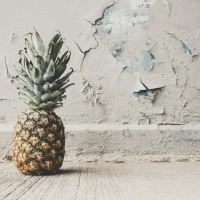Pineapple, with its unmistakable tropical flair and tangy sweetness, often conjures images of exotic vacations and tantalizing fruit salads. But what about our feathered friends in the coop? Can chickens partake in this juicy fruit without any adverse effects? As backyard farming and sustainable living continue to surge in popularity, poultry enthusiasts and novices alike are more curious than ever: Can chickens safely munch on pineapple?
There’s a burgeoning interest in understanding what human foods can safely cross species lines to our domesticated animals. Pineapples, being rich in vitamins, minerals, and fibers seem like they could offer health benefits even to chickens. Yet, the consumption of any human food by animals must be approached with caution due to differences in dietary needs and digestive systems.
In this comprehensive article, we will take a deep dive into the fascinating world of chicken diets and uncover the secrets about whether chickens can indeed savor the taste of pineapple. As a valued addition to flock feeding regimens or a potential risk, it’s time to explore this tropical query.
The Chicken Diet: What Do Chickens Naturally Eat?
Chickens are omnivorous creatures that have a surprisingly varied diet. In their natural habitat, they will peck and forage for a myriad of foods including, but not limited to:
- Seeds and grains
- Insects and bugs
- Small rodents and lizards
- Green vegetation and fruits
Understanding Nutritional Needs
Chickens require a balanced diet to maintain their health and egg production. Like any other species, nutrition is paramount for chickens, and their diet needs to include:
- Protein: Essential for growth, feather production, and egg laying.
- Carbohydrates: Providing energy for optimal health and activity.
- Fats: A concentrated source of energy and necessary for vitamin absorption.
- Vitamins and Minerals: Necessary for various bodily functions, immune health, and bone strength.
Commercial Feed and Natural Supplements
Most chicken owners rely on commercial poultry feeds, which are carefully balanced to meet these nutritional needs. However, many also supplement with kitchen scraps or garden treats to provide variety and additional nutrients. This is where questions about fruits like pineapple usually arise.
Pineapple: A Nutritional Powerhouse for Humans
Pineapple is an exotic fruit that is celebrated for its impressive nutritional profile, which includes:
- Vitamin C: Pineapple is an excellent source, promoting a strong immune system.
- Bromelain: An enzyme known to aid digestion and reduce inflammation.
- Manganese: A mineral crucial for bone health and metabolic function.
- Dietary Fiber: Important for maintaining a healthy digestive system.
Is Pineapple Safe for Chickens?
Given its nutritional benefits for humans, it’s logical to wonder if chickens can derive the same advantages from eating pineapple.
The Pineapple Debate
Some animal nutritionists argue that the acidic nature and high sugar content of pineapples could be detrimental to chickens, as their digestive systems are not designed to handle such foods. Others believe that in moderation, pineapples can be a beneficial snack for your flock.
Pineapple Pros and Cons
The consumption of pineapple by chickens comes with its set of potential positives and negatives. Let’s explore:
Pros:
- Vitamin C can help boost a chicken’s immune system.
- The bromelain enzyme might aid their digestive processes.
Cons:
- The acidity can upset a chicken’s digestive tract if overconsumed.
- The high sugar content could lead to obesity and other health issues in chickens.
Introducing Pineapple to Your Chickens’ Diet
If one decides to feed pineapple to chickens, it must be done with care. Here are a few guidelines for a safe introduction:
Portion Size and Frequency
- Start with small pieces: A few bite-sized chunks to gauge their interest and detect any adverse reactions.
- Sparingly and infrequently: due to the high sugar content.
Preparation is Key
- Remove the tough core: It’s difficult for chickens to digest.
- Peel the skin: The spiky skin can be harmful and is indigestible for chickens.
Monitoring Your Chickens
After feeding pineapple to chickens for the first time, closely monitor their behavior and droppings for any signs of digestive discomfort or health changes.
Potential Risks and Benefits of Pineapple for Chickens
When considering adding pineapple to a chicken’s diet, weigh the potential risks against the possible benefits.
Understanding the Risks
One must consider the following risks:
- Digestive issues: The acidity of pineapple may lead to an upset stomach or diarrhea.
- Nutritional imbalance: If overfed, pineapple can cause chickens to eat less of their nutritionally-complete feed.
Recognizing the Benefits
On the flip side, benefits of pineapple for chickens might include:
- Enrichment: New tastes and textures can reduce boredom in flocks.
- Hydration: Pineapples contain a high water content, which can help in maintaining hydration, especially in hot climates.
Pineapple Alternatives: Other Fruits for Your Flock
If you’re concerned about the possible risks associated with feeding pineapple to chickens, or if your flock simply doesn’t take a liking to it, there are plenty of other fruit options that are generally considered safe and healthy treats:
- Berries (strawberries, blueberries, raspberries)
- Melons (watermelon, cantaloupe, honeydew)
- Apples (without seeds)
Tips for Feeding Fruit to Chickens
- Always remove seeds and pits: Some can be toxic to chickens.
- Chop into appropriate size pieces: To prevent choking.
- Avoid citrus fruits: Generally, these are too acidic for chickens.
Practices for a Healthy Chicken Diet
To ensure a healthy and varied diet for your chickens, follow these important practices:
Balance is Essential
Always maintain a balance between commercial feed and any treats, including fruits like pineapple. The bulk of their diet should always be a high-quality poultry feed.
Moderation in All Things
Treats like pineapple should never exceed 10% of a chicken’s daily intake. This rule ensures they receive adequate nutrition from their main feed.
Observe and Adjust
Pay close attention to your chickens’ health and behavior. If you notice any issues, adjust their diet accordingly, potentially consulting a veterinarian.
Conclusion: Can Chickens Safely Munch on Pineapple?
As we have uncovered throughout this exploration, chickens can technically eat pineapple, but it’s a complex matter. Moderation is the key, along with proper preparation and observance of your chickens’ reactions. By understanding the nuances of a chicken’s dietary needs and respecting their digestive capabilities, chicken owners can make informed decisions about the treats they provide, including the occasional sweet, juicy chunk of pineapple.
In the end, whether or not to include this tropical delight in your chickens’ repertoire of snacks rests in the hands of each discerning poultry keeper. With this comprehensive breakdown of the pineapple and chicken controversy, you are equipped to make the choice that ensures the health and happiness of your flock.










